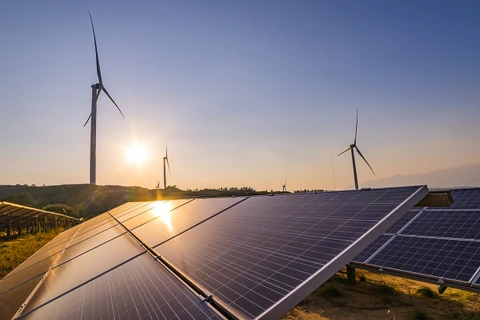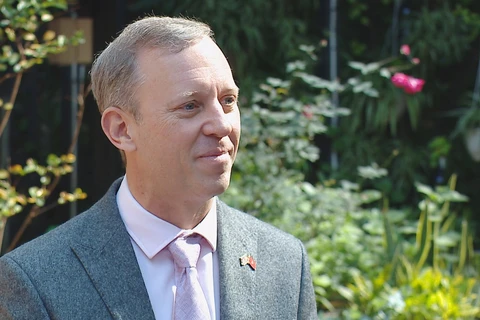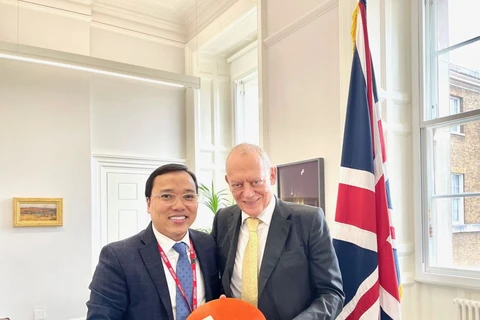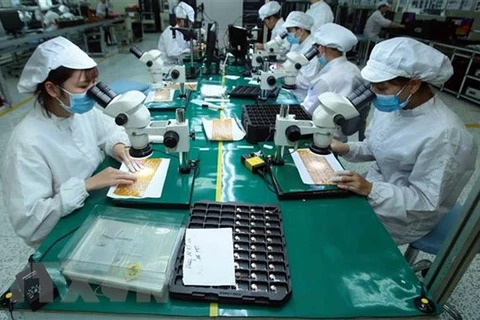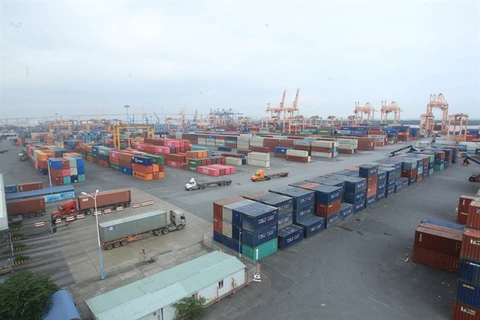Hanoi (VNA) - As the COVID-19 pandemic has been reducing the market demand and the container crisis lasting from the beginning of 2021, the export result of Vietnamese enterprises last year can be considered a miracle.
Contributing to this result, the United Kingdom-Vietnam Free Trade Agreement (UKVFTA) has played the role as a solid lever, thanks to the reduction of import tax to zero after January 1, 2021. Therefore, many products have outstanding competitive advantages in the UK market compared to similar products from China, Thailand, Malaysia, Indonesia and many other countries.
The information was shared by Deputy Minister of Industry and Trade Tran Quoc Khanh at a conference named “One-year journey of the UKVFTA: Remarkable achievement and the vision ahead”, jointly held by the Ministry of Industry and Trade and the UK Embassy in Vietnam on March 15 in both online and in-person formats.
Affirming its advantages despite pandemic
The UK-Vietnam Free Trade Agreement was officially signed in London on December 29, 2020. It was applied temporarily from January 1, 2021, and officially became effective on May 1, 2021.
Luong Hoang Thai, Director of the Multilateral Trade Policy Department under the Ministry of Industry and Trade (MoIT), said that the agreement has created positive spillovers, not only in trade but also in attracting investment from the UK to Vietnam and vice versa.
Data from the MoIT showed that one year after the UKVFTA took temporary effect, trade exchange between the two countries has grown well. In 2021, two-way trade hit 6.61 billion USD, up 17.24% year-on-year, in which Vietnam's exports to the UK increased by 16.4% and the latter's exports rose by 24%.
In the year, there were 48 direct investment projects from the UK into Vietnam, with newly registered capital of more than 53 million USD, a year-on-year surge of 157%, thus helping maintain its total direct investment in the Southeast Asian nation at 4 billion USD. Currently, the UK is among 12 countries with the largest FDI capital in Vietnam.
These figures showed that the UKVFTA is really a “two-way expressway”, helping to promote bilateral trade between the two countries in a more and more balanced direction.
Making most use of opportunities brought by the deal to accelerate
Deputy Minister Khanh emphasised that the UKVFTA is expected to help Vietnam accelerate its institutional reform, improve the investment environment in a modern and transparent manner and create maximum convenience for businesses.
However, after leaving the European Union, the UK is actively negotiating free trade agreements with many partners around the world, including some ASEAN countries. Therefore, the competitive advantage Vietnam has will soon be lost if the UK inks similar pacts with other countries, he noted, asking Vietnamese enterprises to quickly gain a firm foothold in this market, because the potential remains huge.
Sharing the same view, Luong Hoang Thai, Director of the Multilateral Trade Policy Department, stated that Vietnamese goods exported to the UK account for less than 1% of the European country's total imports. On the other hand, the UK’s exports also account for a small portion of Vietnam's imports.
Speaking at the event, MP Graham Stuart, trade envoy of the British Prime Minister in charge of Laos, Vietnam and Cambodia, emphasised that the UK has strengths and experience in renewable energy, including offshore wind power. Therefore, the UK is willing to share its experience with Vietnam to promote trade between the two countries.
The Ministry of Industry and Trade also affirmed that in the coming time, its units will continue to coordinate with relevant agencies of Vietnam and the UK to organise other diverse activities to actively contribute to making practical and effective policies to help the business community make the most of the opportunities brought about by the UKVFTA./.
Contributing to this result, the United Kingdom-Vietnam Free Trade Agreement (UKVFTA) has played the role as a solid lever, thanks to the reduction of import tax to zero after January 1, 2021. Therefore, many products have outstanding competitive advantages in the UK market compared to similar products from China, Thailand, Malaysia, Indonesia and many other countries.
The information was shared by Deputy Minister of Industry and Trade Tran Quoc Khanh at a conference named “One-year journey of the UKVFTA: Remarkable achievement and the vision ahead”, jointly held by the Ministry of Industry and Trade and the UK Embassy in Vietnam on March 15 in both online and in-person formats.
Affirming its advantages despite pandemic
The UK-Vietnam Free Trade Agreement was officially signed in London on December 29, 2020. It was applied temporarily from January 1, 2021, and officially became effective on May 1, 2021.
Luong Hoang Thai, Director of the Multilateral Trade Policy Department under the Ministry of Industry and Trade (MoIT), said that the agreement has created positive spillovers, not only in trade but also in attracting investment from the UK to Vietnam and vice versa.
Data from the MoIT showed that one year after the UKVFTA took temporary effect, trade exchange between the two countries has grown well. In 2021, two-way trade hit 6.61 billion USD, up 17.24% year-on-year, in which Vietnam's exports to the UK increased by 16.4% and the latter's exports rose by 24%.
In the year, there were 48 direct investment projects from the UK into Vietnam, with newly registered capital of more than 53 million USD, a year-on-year surge of 157%, thus helping maintain its total direct investment in the Southeast Asian nation at 4 billion USD. Currently, the UK is among 12 countries with the largest FDI capital in Vietnam.
These figures showed that the UKVFTA is really a “two-way expressway”, helping to promote bilateral trade between the two countries in a more and more balanced direction.
Making most use of opportunities brought by the deal to accelerate
Deputy Minister Khanh emphasised that the UKVFTA is expected to help Vietnam accelerate its institutional reform, improve the investment environment in a modern and transparent manner and create maximum convenience for businesses.
However, after leaving the European Union, the UK is actively negotiating free trade agreements with many partners around the world, including some ASEAN countries. Therefore, the competitive advantage Vietnam has will soon be lost if the UK inks similar pacts with other countries, he noted, asking Vietnamese enterprises to quickly gain a firm foothold in this market, because the potential remains huge.
Sharing the same view, Luong Hoang Thai, Director of the Multilateral Trade Policy Department, stated that Vietnamese goods exported to the UK account for less than 1% of the European country's total imports. On the other hand, the UK’s exports also account for a small portion of Vietnam's imports.
Speaking at the event, MP Graham Stuart, trade envoy of the British Prime Minister in charge of Laos, Vietnam and Cambodia, emphasised that the UK has strengths and experience in renewable energy, including offshore wind power. Therefore, the UK is willing to share its experience with Vietnam to promote trade between the two countries.
The Ministry of Industry and Trade also affirmed that in the coming time, its units will continue to coordinate with relevant agencies of Vietnam and the UK to organise other diverse activities to actively contribute to making practical and effective policies to help the business community make the most of the opportunities brought about by the UKVFTA./.
VNA

